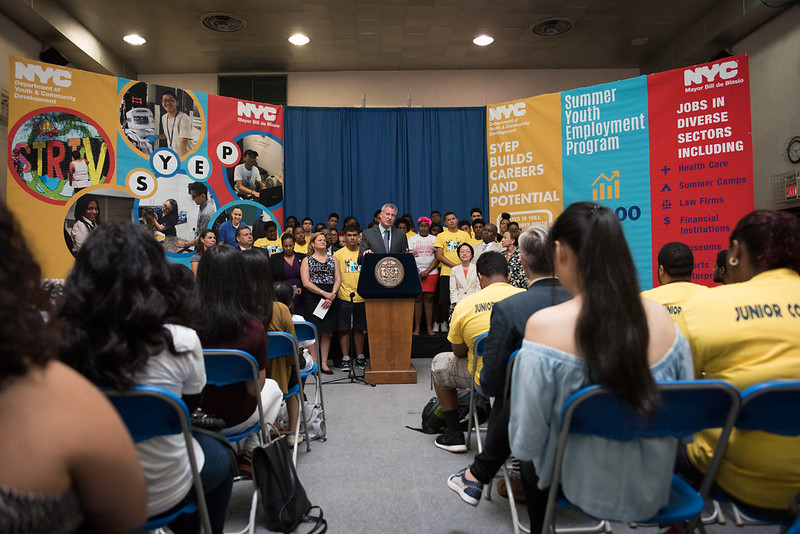
Mayor de Blasio with city youth (photo: Michael Appleton/Mayor's Office)
The coronavirus pandemic that has ravaged New York City since early last year has presented daunting challenges for our youth and young adults. Students from pre-kindergarten through college have missed out on months of in-person instruction, not to mention the countless everyday interactions beyond the classroom that help them discover who they are and who they want to be. Young adults who held jobs before COVID-19 are disproportionately likely to have fallen out of work in the months since then, as the economic sectors most likely to employ them—food service, hospitality, retail—have been among the hardest hit.
These recent traumas should not overshadow a painful truth: even before the pandemic, far too many young New Yorkers reached adulthood without the educational credentials, in-demand skills, relevant experience, or support system to fully realize their aspirations. In 2018, one in eight New York City residents ages 16 to 24 was out of school and out of work—a status with ominous long-term implications both for their individual success and for our community. Adding enormous pressure on a system that was already falling short, COVID-19 could push that number to one in four.
In this context, the city’s Disconnected Youth Task Force has just released a report, Connecting Our Future, that looks closely at who New York City’s out of school and out of work young people are, how we’re serving them, and what we can do to more effectively address their immediate and long-term needs.
Since taking office in 2014, Mayor de Blasio’s highest priority has been to render New York the most equitable big city in America. That aspiration starts with making sure every young person has access to high quality educational and developmental opportunities that can put them on a path to career readiness, economic security, and fully engaged citizenship.
This vision helped spur Pre-K for All. It deeply informed the Equity and Excellence for All initiatives of the Department of Education, which has greatly expanded college access and student supports. It was why we doubled the number of slots in the Summer Youth Employment Program since the mayor took office, reaching 75,000 in 2019. It was also the motivation behind major investments the City has made in CUNY programs such as Accelerated Success in Associate Programs (ASAP).
And it is why, in the current crisis, the mayor is announcing a series of actions to provide immediate assistance for youth and young adults.
One new initiative will help young New Yorkers earn their driver’s license and then connect to career-track jobs in the transportation sector. Another effort, in collaboration with CUNY, will target thousands of former college students who did not complete their degrees and Class of 2020 high school graduates who were accepted into CUNY but have not yet matriculated, providing support to get them back on track for higher education.
Finally, we have redesigned the Work Learn & Grow program to focus on college readiness and work experience: this past fall, more than 2,100 high school students had opportunities to earn college credit, and this winter they have begun paid internships through which they can earn up to $3,000.
Beyond the short term, the Task Force report also calls upon the City to embrace a long-term vision to make sure that every young New Yorker reaches adulthood fully prepared for career success. The CareerReadyNYC report we released in July 2019 provides this vision, calling for closer alignment between educational and career exploration/work readiness experiences, as well as fuller partnerships between the City and our robust employer and philanthropic communities. While much more needs to be done, this work is well underway.
Inevitably, the disruptions of 2020 have slowed our progress. But they have not shaken our commitment to our city’s youth. Over the course of 2021, that will mean centering them in New York City’s recovery. Further out, we must build and relentlessly improve connected systems to make sure every young New Yorker can go as far as their talent and drive will take them.
***
J. Phillip Thompson is New York City Deputy Mayor for Strategic Policy Initiatives. On Twitter @NYCMayorsOffice.
***
Have an op-ed idea or submission for Gotham Gazette? Email This email address is being protected from spambots. You need JavaScript enabled to view it.